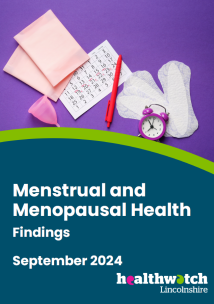Menstrual and Menopausal Health Report 2024

Healthwatch Lincolnshire conducted this survey on menstrual and menopausal health services to support the health and care system by ensuring that residents' experiences are considered in the ongoing development and delivery of women’s health services in the county.
By capturing insights into the accessibility and quality of services, the report aims to highlight both strengths and areas for improvement in care for menstrual health conditions like endometriosis, polycystic ovary syndrome (PCOS), and menopausal issues.
The findings from this survey will contribute directly to shaping the Women’s Health Strategy in Lincolnshire and ensure that the Integrated Care Board’s Women’s Health Hub reflects the needs of local women.
Overall findings:
The Healthwatch Lincolnshire Menstrual and Menopausal Health Survey conducted in September 2024 gathered insights from 450 respondents about their experiences. Key findings include:
Healthcare Access and Experiences:
- Diagnosis: Symptoms of menstrual health conditions were frequently ignored or normalised. Many women felt they were not listened to or taken seriously. Delayed diagnosis, particularly for endometriosis and PCOS, was a recurring issue, with long waiting times for specialist referrals.
- Mental Health: The impact of menstrual health on mental health was poorly understood and rarely acknowledged, with many women feeling that healthcare providers did not offer sufficient emotional or wellbeing support.
Treatment and Services:
- Medication: Access to effective medications like Hormone Replacement Therapy (HRT) was a common concern, with some women facing delays or being prescribed antidepressants instead of HRT, contrary to clinical guidelines.
- Satisfaction: While some respondents praised their GP for listening and acting quickly, many raised concerns about a lack of knowledge and empathy among healthcare professionals regarding menstrual health issues.
Areas for Improvement:
- Better Training for Healthcare Professionals: Improved education and awareness around menstrual and menopausal health conditions for primary care professionals.
- Faster Diagnosis and Treatment: Quicker access to diagnostic tests and more timely treatment to reduce long waiting periods for care.
- Holistic Support: Calls for better emotional support and guidance on managing symptoms, including alternatives to medication like lifestyle changes, diet, and alternative therapies.
Downloads
A download link to the report is available below. If you need the report in another format or would like to discuss its contents, please email info@healthwatchlincolnshire.co.uk or call 01205 820 892.

